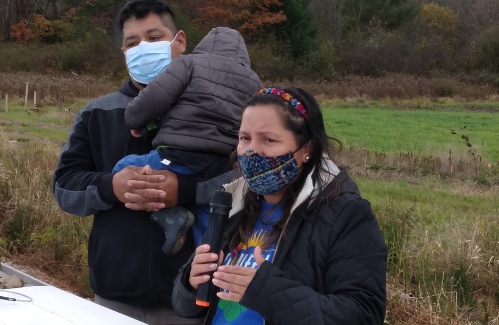Published: 10/10/2022 7:39:27 PM
Modified: 10/10/2022 7:39:17 PM
NORTHAMPTON — Portraits of local farmworkers and their stories, along with a history of their efforts to secure more rights, are on display at the Botanic Garden at Smith College through December.
“No Somos Maquinas,” also known as “We Are Not Machines: Farmworker Resistance in the Connecticut River Valley” is a project of the Pioneer Valley Workers Center and the Botanic Garden. It is the first fully bilingual exhibit at the Botanic Garden.
An opening reception and panel will be held on Thursday at 6:30 pm at the college’s Weinstein Auditorium, in which farmworkers will discuss their experiences and explore how legislative changes, organizing and solidarity can better conditions for those working in agriculture in western Massachusetts.
“It’s been so powerful to spend these past few months assembling the stories of farmworker leaders and members who each have such inspiring stories and experiences that everyone should know about,” said Andrea Schmid, communications organizer for the workers center, in a statement.
The exhibit’s focus will be on the immigration system and the exclusion of farm workers from labor protections and laws on work conditions. It includes photographs, interpretive panels and a timeline, as well as audio and oral history excerpts, all in both Spanish and English.
This marks the second No Somos Maquinas project. In 2016, oral histories and black and white portraits of 25 restaurant workers in Northampton were displayed at APE Gallery. At that time, the base of the Pioneer Valley Workers Center was people in the restaurant industry. Six years later, that base is predominantly undocumented farmworkers from Central America, Schmid said.
Sarah Loomis, manager of education at the Botanic Garden, said an important mission of the site is to share stories from multiple perspectives, including those who have been historically silenced and ignored.
“This exhibit highlights the humanity behind our local food and lifts up the voices of people essential to the agricultural landscape,” Loomis said.
Workers Center Co-Director Alfonso Neal, also a photographer for the exhibit, said the pictures help to show the fight for dignity and respect farmworkers are engaged in.
“Behind their eyes is a fierce determination to leave the world in better shape than how it’s found,” Neal said.

